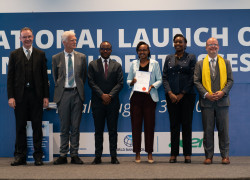PwC - Luxembourg introduces new transfer pricing legislation
The Luxembourg Government announces a new transfer pricing regime applying the arm’s length principle and introducing transfer pricing documentation requirements
Under current domestic law, the Luxembourg tax authorities have the right to estimate the financial outcome of a transfer of profits between a company that pays taxes in Luxembourg and a related party abroad, with the concept of ‘related party’ being broadly defined, using the term ‘special economic relationship’. The proposed draft, however, aligns itself more closely with the OECD Tax Model Convention in that it explicitly states the arm’s length principle
Marc Rasch, Transfer Pricing Partner at PwC Luxembourg
As indicated in last year’s coalition programme, the 2015 tax budget, which the Luxembourg Government presented on 15 October 2014, includes provisions that further formalise legislation on transfer pricing. The draft law clearly restates the arm’s length principle, confirms that further legislation is to be introduced through a subsidiary Grand-Ducal Regulation, and makes more explicit the need for transfer pricing documentation.
The long arm of the law
Transfer pricing, which can be an important factor in determining the allocation of profits between parts of a multinational corporation, has for many years been the cause of disputes between tax authorities and businesses that operate across national borders. The OECD has striven over the last five decades to give guidance and bring about an internationally consistent approach to this often highly difficult issue. One of the cornerstones of the OECD’s approach, now embedded in most double tax treaties, is the ‘arm’s length’ principle. Put simply, in a transaction between entities within the same group or commonly-controlled corporate structure, the price used (the transfer price) should be the same as if the two companies involved were independent of each other.
“Under current domestic law, the Luxembourg tax authorities have the right to estimate the financial outcome of a transfer of profits between a company that pays taxes in Luxembourg and a related party abroad, with the concept of ‘related party’ being broadly defined, using the term ‘special economic relationship’. The proposed draft, however, aligns itself more closely with the OECD Tax Model Convention in that it explicitly states the arm’s length principle,” notes Marc Rasch, Transfer Pricing Partner at PwC Luxembourg
Not only does this principle set the pricing rules for cross-border transactions within a multinational organisation. It will from next year also apply to transactions made between two related entities both located in Luxembourg. Moreover, the new draft will oblige Luxembourg companies to report any adjustments of profits in their tax returns whenever transfer prices do not reflect the arm’s length principle. And the extended reporting requirements do not stop there.
Show and tell
Although at present, tax authorities may request specific information from a company to verify a fiscal liability, Luxembourg tax legislation currently contains no specific provisions governing transfer pricing documentation. The 2015 Budget Bill will change this by introducing more explicit wording in the general law that will oblige taxpayers to provide all supporting documentation whenever the Luxembourg tax authorities are seeking to verify transfer prices.
Under the proposed legislation, the position of a taxpayer that has not justified the transfer pricing it has used as being in line with the arm’s length principle becomes much more difficult, should the tax authorities investigate. “They will examine the transaction in question and – as there would be no back-up for what has been done – presume that there has been an undue reduction in profits and go on to impose an extra tax charge, without any obligation to provide detailed justification for their action. So not being able to submit the proper transfer pricing documentation in effect results in a reversal of the ‘burden of proof’, onto the taxpayer,” says Caroline Goemaere, Transfer Pricing Partner at PwC Luxembourg.
The nature and extent of the documentation needed will depend on the circumstances of the case under consideration. The Government already made it clear that the burden should be lighter for smaller businesses, or for less complex transactions.
Time for change
The proposed new transfer pricing legislation not only represents an updating of the current national tax law; it also makes a clear statement re-iterating that Luxembourg is committed to fair and transparent transfer pricing in line with OECD standards.
Given that increasing attention and resources are being dedicated to transfer pricing matters, Luxembourg taxpayers should make sure their transfer prices are consistent with the arm’s length principle, and are always supported by sound documentation, including an economic analysis.
To download our Flash News dedicated to the new transfer pricing legislation, visit: http://www.pwc.lu/en/transfer-pricing/docs/pwc-transfer-pricing-311014.pdf
Communiqués liés
RSA launches technology and management liability insurance s...
RSA Luxembourg, part of Intact Insurance Specialty Solutions, today announces th...
Lancement d'une nouvelle connexion intermodale entre Bettemb...
CFL multimodal a le plaisir d'annoncer le lancement de sa nouvelle connexion i...
Experts from LUNEX award first micro-credentials in Rwanda o...
The Rwanda Ministry of Education (MINEDUC) formally inaugurated Syllabi, a publi...
ERG Notes that ENRC Secures Landmark Victory as Court of App...
Eurasian Resources Group (ERG), a leading diversified natural resources group he...
LetzToken et La Vie est Belle annoncent leur partenariat ouv...
«?LetzToken?», plateforme de tokenisation pionnière basée à Luxembourg, et ...
ERG announces a Pre-Export Finance Facility Agreement based ...
Eurasian Resources Group (“ERG”, “The Group”), a leading diversified nat...
Il n'y a aucun résultat pour votre recherche







